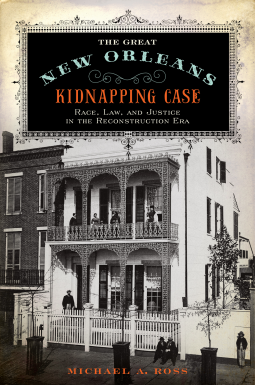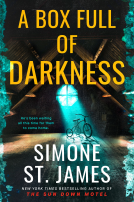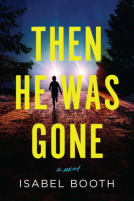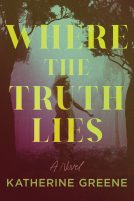
The Great New Orleans Kidnapping Case
Race, Law, and Justice in the Reconstruction Era
by Michael A. Ross
This title was previously available on NetGalley and is now archived.
Buy on Amazon
Buy on BN.com
Buy on Bookshop.org
*This page contains affiliate links, so we may earn a small commission when you make a purchase through links on our site at no additional cost to you.
Send NetGalley books directly to your Kindle or Kindle app
1
To read on a Kindle or Kindle app, please add kindle@netgalley.com as an approved email address to receive files in your Amazon account. Click here for step-by-step instructions.
2
Also find your Kindle email address within your Amazon account, and enter it here.
Pub Date Oct 14 2014 | Archive Date Oct 06 2014
Description
Winner of the Kemper and Leila Williams Prize of the Historic New Orleans Collection and the Louisiana Historical Association.
Winner of the New Orleans Public Library Foundation Choice Award for Non-Fiction.
In June 1870, the residents of the city of New Orleans were already on edge when two African American women kidnapped seventeen-month-old Mollie Digby from in front of her New Orleans home. It was the height of Radical Reconstruction, and the old racial order had been turned upside down: black men now voted, held office, sat on juries, and served as policemen. Nervous white residents, certain that the end of slavery and resulting "Africanization" of the city would bring chaos, pointed to the Digby abduction as proof that no white child was safe. Louisiana's twenty-eight-year old Reconstruction governor, Henry Clay Warmoth, hoping to use the investigation of the kidnapping to validate his newly integrated police force to the highly suspicious white population of New Orleans, saw to it that the city's best Afro-Creole detective, John Baptiste Jourdain, was put on the case, and offered a huge reward for the return of Mollie Digby and the capture of her kidnappers. When the Associated Press sent the story out on the wire, newspaper readers around the country began to follow the New Orleans mystery. Eventually, police and prosecutors put two strikingly beautiful Afro-Creole women on trial for the crime, and interest in the case exploded as a tense courtroom drama unfolded.
In The Great New Orleans Kidnapping Case, Michael Ross offers the first full account of this event that electrified the South at one of the most critical moments in the history of American race relations. Tracing the crime from the moment it was committed through the highly publicized investigation and sensationalized trial that followed, all the while chronicling the public outcry and escalating hysteria as news and rumors surrounding the crime spread, Ross paints a vivid picture of the Reconstruction-era South and the complexities and possibilities that faced the newly integrated society. Leading readers into smoke-filled concert saloons, Garden District drawing rooms, sweltering courthouses, and squalid prisons, Ross brings this fascinating era back to life.
A stunning work of historical recreation, The Great New Orleans Kidnapping Case is sure to captivate anyone interested in true crime, the Civil War and its aftermath, and the history of New Orleans and the American South.
Winner of the New Orleans Public Library Foundation Choice Award for Non-Fiction.
In June 1870, the residents of the city of New Orleans were already on edge when two African American women kidnapped seventeen-month-old Mollie Digby from in front of her New Orleans home. It was the height of Radical Reconstruction, and the old racial order had been turned upside down: black men now voted, held office, sat on juries, and served as policemen. Nervous white residents, certain that the end of slavery and resulting "Africanization" of the city would bring chaos, pointed to the Digby abduction as proof that no white child was safe. Louisiana's twenty-eight-year old Reconstruction governor, Henry Clay Warmoth, hoping to use the investigation of the kidnapping to validate his newly integrated police force to the highly suspicious white population of New Orleans, saw to it that the city's best Afro-Creole detective, John Baptiste Jourdain, was put on the case, and offered a huge reward for the return of Mollie Digby and the capture of her kidnappers. When the Associated Press sent the story out on the wire, newspaper readers around the country began to follow the New Orleans mystery. Eventually, police and prosecutors put two strikingly beautiful Afro-Creole women on trial for the crime, and interest in the case exploded as a tense courtroom drama unfolded.
In The Great New Orleans Kidnapping Case, Michael Ross offers the first full account of this event that electrified the South at one of the most critical moments in the history of American race relations. Tracing the crime from the moment it was committed through the highly publicized investigation and sensationalized trial that followed, all the while chronicling the public outcry and escalating hysteria as news and rumors surrounding the crime spread, Ross paints a vivid picture of the Reconstruction-era South and the complexities and possibilities that faced the newly integrated society. Leading readers into smoke-filled concert saloons, Garden District drawing rooms, sweltering courthouses, and squalid prisons, Ross brings this fascinating era back to life.
A stunning work of historical recreation, The Great New Orleans Kidnapping Case is sure to captivate anyone interested in true crime, the Civil War and its aftermath, and the history of New Orleans and the American South.
Available Editions
| EDITION | Other Format |
| ISBN | 9780199778805 |
| PRICE | $27.95 (USD) |


















